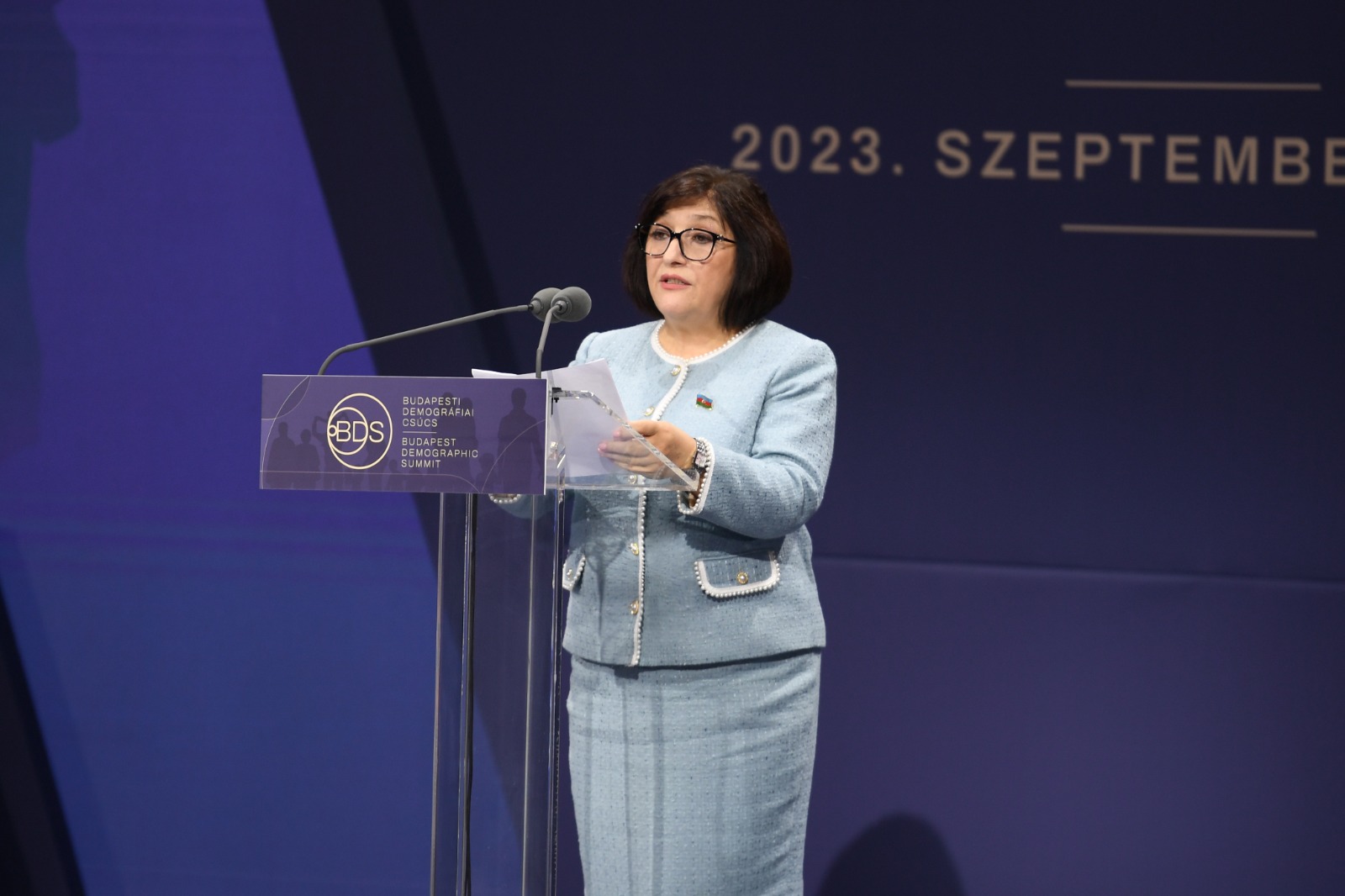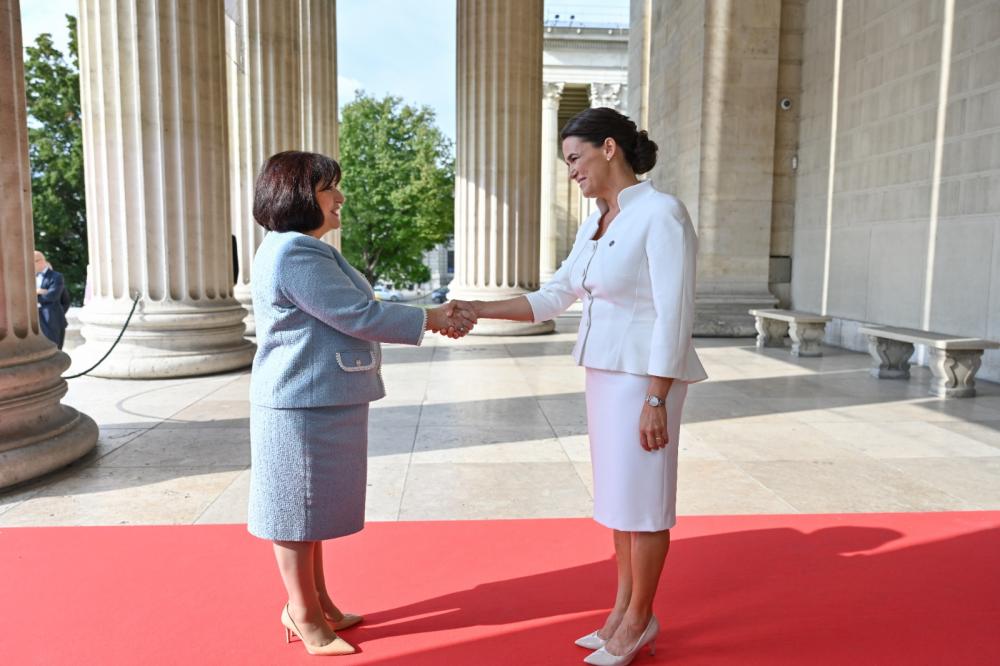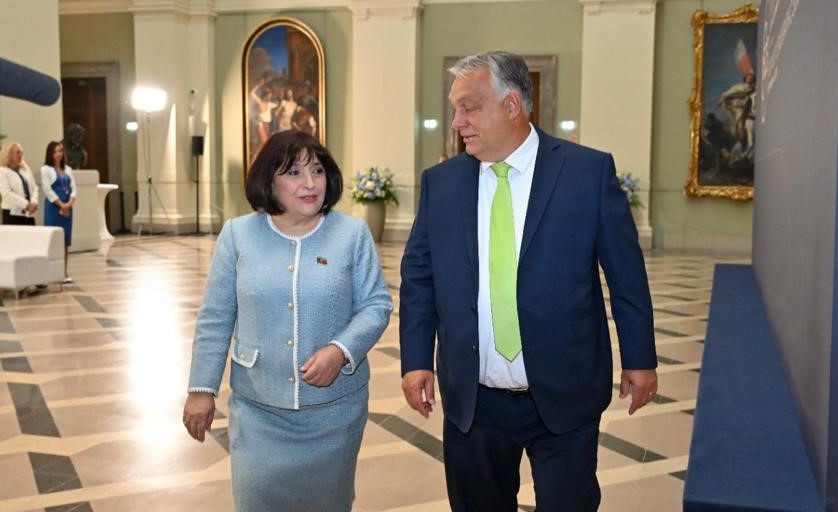Milli Majlis Chair Sahiba Gafarova Speaks at V Budapest Demographic Forum

Speaker of the Milli Majlis Sahiba Gafarova delivered a speech at the V Budapest Demographic Forum Family: The Key to Security on 14 September.
Mrs Gafarova’s speech began with a commentary on the importance of the Summit and its topicality being very much to the point currently. She said she hoped that forthcoming discussions would prove useful and that new ideas and prospects regarding solution of demographic and family problems would be brought forth during the gathering.
Then, Sahiba Gafarova shared with the Summit participants Azerbaijan’s vision and experience linked to the family institution. Since the Azerbaijani society rests on traditional and family values, the family plays an irreplaceable role in its progress and is regarded as the keeper of the traditions and the national and moral values – the very ones that define our nation. It is family that communicates such values as loyalty, reciprocal love, respect for parents and elders and the cultural heritage from generation to generation, Mrs Gafarova was saying.
‘…The family values are one of the core reasons why representatives of diverse ethnic and religious groups have lived in dignity, peace and friendship in Azerbaijan for centuries,’ stressed the leader of the Azerbaijani legislature.
‘The family policy is one of the state policy priorities. A solid legislative framework is in place as regards the family issues. The Constitution, the main law of our country, defines the essence of the family and puts the family, marriage and children under state protection. The Family Code adopted in 1999 is specific as to the rights and obligations of family members. Other laws, including those on gender equality, child’s rights, prevention of household violence, come in to regulate family relations additionally. The process whereby laws are elaborated, passed and carried out is marked by close co-ordination between the parliamentary Family, Women’s and Children’s Affairs Committee and the state body responsible for family matters, it being the State Family, Women’s and Children’s Affairs Committee.’
Going further, the Speaker of the Milli Majlis said that strengthening the institution of the family and supporting its development are priorities of our Government's social policy, and initiatives such as direct social payments to low-income families and people with disabilities, targeted allowances, and mortgage loans to young families have led to improvements in family welfare. The result of this comprehensive approach to family issues is the rapid demographic growth of our population. The population of Azerbaijan numbered 7 million in 1990 whereas it exceeds 10 million today.
According to Madam Speaker, this positive demographic trend was achieved despite the most serious trial any country could ever be facing, namely, an occupation of her territories. Twenty per cent of the internationally recognised territory of Azerbaijan were occupied by the neighbouring Armenia in the early ‘90s and remained occupied for as long as 30 years.
Occupation and war forever have the longest impacts on no other but the family, in which sense the Armenian occupation was devastating to the survival of our families. More than twelve thousand people fell victim to the occupation. The genocide that Armenia committed in the Azerbaijani town of Khojali in February 1992 destroyed whole families. More than one hundred and fifty children lost one or both parents. As many as six hundred and thirteen civilians were killed. Furthermore, the ethnic cleansing carried out by Armenia forced a million Azerbaijanis – more than two hundred and thirty thousand families – out of their homes. They were internally displaced from the captured territories in Garabagh and were refugees from Armenia. Left homeless, unemployed and without any means of livelihood, those million people came on as a grave social and economic burden to the young independent state. However, the Government shouldered and carried that weight and did everything to meet the needs of the refugee families and IDP, Mrs Gafarova continued.
According to the head of the Milli Majlis, Azerbaijan resorted to its right of self-defence subject to Article 51 of the UN Charter and went ahead to carry into life the resolutions of the UN Security Council as well as international law standards and principles back in 2020. That was how the territorial integrity of Azerbaijan was restored. In this context, we are thankful to our partners and friends, first and foremost the Hungarian brothers and sisters, for the constant attention to and care of stabilisation and rapprochement in the South Caucasus – the care based on international law.
Our lands in question were liberated at the cost of lives of 3,000 young people, Sahiba Gafarova recalled before telling her audience, ‘Simply imagine how many families lost sons and future generations.’
‘The liberation of our territories is a triumph of historical justice. But it is also a victory of the moral and family values of our young generation who had had to leave their homes as young children thirty years ago and then returned to reclaim their ancestral lands.’
The strong political will of our Government led by His Excellency President Ilham Aliyev and the resolve of our nation are continuing the large-scale restoration and building operations in the freed lands today. Armenia had destroyed almost all the towns and village and had vandalised the whole historical, cultural and cult heritage of Azerbaijan in those provinces during their captivity. Eight towns and hundreds are villages are being built anew now; and so are roads, bridges, power plants, schools, hospitals and houses. The former IDP families have begun to return to their houses. More than thirty thousand families will make a come-back within the next three years in line with the First Grand Return to the Liberated Territories of Azerbaijan Programme. Social aid is the key element of the Grand Return Programme. This is central also to the agenda of the Heydar Aliyev Foundation.
‘We are intending to celebrate the 30th anniversary of the International Family Year as declared by the United Nations Organisation. It should be mentioned here that the concept of family is higher on today’s agenda than it has ever possibly been,’ Mrs Gafarova said.
Armed conflicts, migrations, social and economic problems as well as the pandemics all pose hazards to family security. The role of the family is called into question in the face of such problems. The degradation of familial values, the denigration of the traditional family model and the attempts at marginalising it – all those are threatening the very foundations of the family. It is of the utmost importance to recognise the very essence of the concept of the family and the fact that the institution of the family is the basic and most important unit of society to such a backdrop.
Sahiba Gafarova went further to say that more must be done to improve the prosperity of the family and targeted legislative frameworks as well as social policies and programmes should be developed. Obviously, the subject-matter has transgressed national and societal boundaries and requires closer international co-operation and advanced experience exchange.
‘The family policy of the Hungarian Government deserves appreciation in this context… the hosting of such an important forum signifies Hungary’s commitment to international co-operation in family matters. Azerbaijan as a country sharing identical family values with Hungary is ready to support this co-operation through combined actions and events,’ Sahiba Gafarova was saying.
The other speakers at the V Budapest Demographic Forum were Hungarian President Katalin Novák, Bulgarian President Rumen Radev, Italian Prime Minister Giorgia Meloni, Tanzanian Vice President Philip Isdor Mpango and Hungarian PM Victor Orban. Those orators focused on the outcomes of the modern-world demographic transformation, migration issues, the impacts of wars, conflicts and crises on populations and preservation of familial values in the society.
Hungarian PM Victor Orban expressed his affability and greetings to Azerbaijani President Ilham Aliyev, mentioned the close ties between the two states and reminded the audience of Hungary’s engagement in the work that the Turkic Council is doing. Mr Orban also mentioned the pertaining endeavours of Azerbaijan’s First Vice President Mehriban Aliyeva.
According to Mr Orban, Azerbaijan has taken important steps forward in terms of gaining more political weight and furthering the national economic growth over the past few years.
The Press and Public Relations Department
The Milli Majlis



_1694705482_1694717148.jpeg)

_1694705482_1694717148.jpeg)
_1694705482_1694717148.jpeg)
_1694705483_1694717148.jpeg)

_1694709285_1694717148.jpeg)

